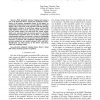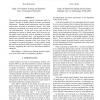50 search results - page 7 / 10 » Speaker and Channel Factors in Text-Dependent Speaker Recogn... |
ICASSP
2010
IEEE
13 years 6 months ago
2010
IEEE
Prosodic information has been successfully used for speaker recognition for more than a decade. The best-performing prosodic system to date has been one based on features extracte...
ICPR
2010
IEEE
13 years 5 months ago
2010
IEEE
Pitch mismatch between training and testing is one of the important factors causing the performance degradation of the speaker recognition system. In this paper, we adopted the mis...
CORR
2004
Springer
13 years 7 months ago
2004
Springer
This paper gives an overview of the assessment and evaluation methods which have been used to determine the quality of the INSPIRE smart home system. The system allows different h...
ICASSP
2009
IEEE
14 years 2 months ago
2009
IEEE
The popular mel-frequency cepstral coefficients (MFCCs) capture a mixture of speaker-related, phonemic and channel information. Speaker-related information could be further broke...
ICASSP
2008
IEEE
14 years 2 months ago
2008
IEEE
Recently, a novel and structural representation of speech was proposed [1, 2], where the inevitable acoustic variations caused by nonlinguistic factors are effectively removed fro...


